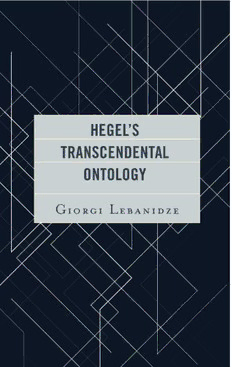
Hegel’s Transcendental Ontology PDF
Preview Hegel’s Transcendental Ontology
Hegel’s Transcendental Ontology Hegel’s Transcendental Ontology Giorgi Lebanidze LEXINGTONBOOKS Lanham•Boulder•NewYork•London PublishedbyLexingtonBooks AnimprintofTheRowman&LittlefieldPublishingGroup,Inc. 4501ForbesBoulevard,Suite200,Lanham,Maryland20706 www.rowman.com 6TinworthStreet,LondonSE115AL Copyright©2019byTheRowman&LittlefieldPublishingGroup,Inc. Allrightsreserved.Nopartofthisbookmaybereproducedinanyformorbyany electronicormechanicalmeans,includinginformationstorageandretrievalsystems, withoutwrittenpermissionfromthepublisher,exceptbyareviewerwhomayquote passagesinareview. BritishLibraryCataloguinginPublicationInformationAvailable LibraryofCongressCataloging-in-PublicationData Name:Lebanidze,Giorgi,1973–,author. Title:Hegel’stranscendentalontology/GiorgiLebanidze. Description:Lanham,MD:LexingtonBooks,2018.|Includesbibliographicalreferencesandindex. Identifiers:LCCN2018046744(print)|LCCN2018048341(ebook)|ISBN9781498561341(elec- tronic)|ISBN9781498561334(cloth:alk.paper) Subjects:LCSH:Hegel,GeorgWilhelmFriedrich,1770–1831.|Concepts.|Hegel,GeorgWilhelm Friedrich,1770–1831.WissenschaftderLogik. Classification:LCCB2949.C49(ebook)|LCCB2949.C49L422018(print)|DDC111—dc23 LCrecordavailableathttps://lccn.loc.gov/2018046744 TMThepaperusedinthispublicationmeetstheminimumrequirementsofAmerican NationalStandardforInformationSciencesPermanenceofPaperforPrintedLibrary Materials,ANSI/NISOZ39.48-1992. PrintedintheUnitedStatesofAmerica Contents ListofAbbreviations vii Introduction ix 1 Hegel’sCritiqueofAlternativePositions 1 2 DeterminationsofReflectionandGenerationofConceptualContent 31 3 Hegel’sTheoryoftheConceptandItsKantianOrigins 53 4 TheMomentsoftheConcept 73 5 FailedFormsofSyllogisticMediation 97 6 TheSyllogismofNecessity 119 Bibliography 139 Index 145 AbouttheAuthor 151 v List of Abbreviations Abbreviations for frequently cited primary texts are given below; details for lessfrequentlycitedtextsaregiveninfullinthenotes. EL Hegel’sTheEncyclopaediaLogic.ExcerptsfromHegel’sThe EncyclopaediaLogic:PartIoftheEncyclopaediaofthe PhilosophicalSciencewiththeZustz,translated,withintroductionand notes,byT.F.Geraets,W.A.Suchting,andH.S.Harris(Hackett 1991).ReprintedbypermissionofHackettPublishingCompany,Inc. SL Hegel’sTheScienceofLogic.EditedandtranslatedbyGeorgedi Giovanni.GeorgWilhelmFriedrichHegel:TheScienceofLogic,© GeorgediGiovanni2010,publishedbyCambridgeUniversityPress. Reprintedwithpermission. vii Introduction The recent debate over Hegel’s philosophy is carried out along the lines of the Kantian-epistemological vs. metaphysical interpretations of his position. Those belonging to the first camp understand Hegel as the figure who brought the Kantian epistemological turn in philosophy to its completion, leaving behind the questions of traditional metaphysics regarding the ulti- matestructureofrealitythatunderliesthemereappearanceandtruenatureof God, soul, and the world. The general line taken by these commentators is thatalthoughHegeldoesnotstopshortofusingtheterminologyoftradition- al metaphysics (such as God, infinite, absolute, etc.), the philosophically significant core of his position is independent of these archaic elements, whichthereforecanbeliftedoutofhisoverallcorpuswithoutsustainingany philosophicallysignificantloss.Thoughnotalwaysexplicitlyacknowledged, these Hegel scholars stand in the long tradition of trying to rescue what is alive in Hegel from what is dead and ought to be left behind. The essential kernelofHegel’ssystemworthrescuing,accordingtothesecommentators,is theKantiantranscendentalprojectbroughttoitscompletion. Thecentralfigureamongthecommentatorswhoconsiderthecompletion of Kantian transcendental epistemology central to Hegel’s legacy is Robert Pippin, whose groundbreaking Hegel’s Idealism, published in 1989, set a newstageinHegelscholarship.Inthebook,Pippinaimstodemonstratethat the issues most important to Hegel’s project can be traced back to Kantian criticalepistemology.UncoveringtheKantianoriginsofHegel’sphilosophy, accordingtoPippinandhisfollowers,allowsustointerpretHegelasapost- Kantian epistemologist whose doctrine can be set free of any substantive ontologicalcommitments.ThisapproachinvitesustoreadHegel’stwocen- tralworks,LogicandPhenomenology,asinvestigationswithinthenormative authorityofthepureconceptsofunderstandingasthemeansbywhichreality ix
